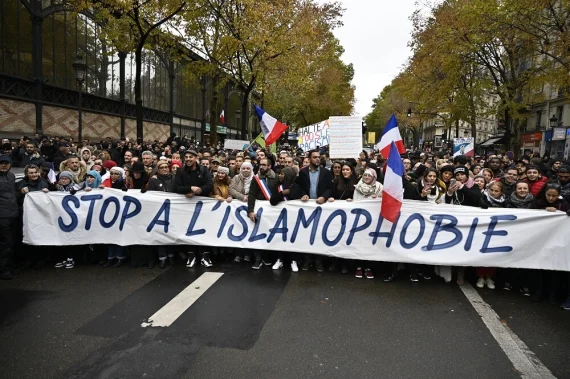Interviewers: Faruk Yaslıçimen, Nihan Duran
Interviewee: Raphael Liogier
Affiliation : Ibn Haldun University, PhD candidate (Political Science and International Relations) at Izmir University of Economics
Organization/Publisher: Politics Today
Date/Place: Jan 9, 2021/ France
Type of Literature: Interview
Word Count: 1884
Keywords: Islamo-paranoia, Islamophobia, Europe, France, Emmanuel Macron
Brief:
In this interview with French sociologist Rafael Liogier, regarding the rise of hostile political rhetoric against the Muslim community in France, Liogier suggests that the nature of Islamophobia has changed over the last decade, not only in France, but globally. He observes that there is Islamo-paranoia in France, and when people are in a paranoid state they simply assume there is a plot and intention. Accordingly, this state of paranoia allows the French to do anything to protect themselves. Furthermore, it is caused by the Europeans’ loss of self-image, which they had used to feel a sense of being the center of the world. Up until 2003, Europe still had visibility of morality by supporting human rights. However, the United States’ decision to start a war in Iraq without consulting the Europeans, and being treated as colonies solidified the loss of centrality over the US. After this, all the new political parties founded have followed an anti-Islamism agenda across Europe. For instance, the French Front National party which appeared as an anti-Semitic party when first founded, reformulated itself as an anti-Islamic party. Furthermore, after 2004, the French Government started taking actions such as preventing head scarves in public schools. The feeling of losing something that is not describable caused narcissistic anxiety, which is where the target research begins. Since that, Muslims had already been presented in a certain outlook on TV shows (as in beards, face veils, etc.), and the characters heard saying, “If the French law prevents me from practising my religion, I will not obey,” caused the perception that Muslims are betrayers to the Republic. Rafael believes that Macron himself is not a racist, rather he follows what the public demands to win the election. The author states that neither Macron nor any politician in the current government would fight against these current racist populists. Especially after the terrorist attack in Paris in October 2019, the public forced politicians and journalists to pick a side, having found the enemy and target as Muslims. Macron wants to be a hero, so he wants to anticipate the majority of the French Public. Liogier states that to overcome this misperception, firstly, the constant talk debates regarding Islam per se need to stop because such talks only manifest complexes of the French but not the Muslim people. Secondly, to ease the public’s socio-psychological tension and stop looking for reasons to argue, so that people can focus on what is happening. The energy-consuming and offensive behaviour has made the public “scared even of their own shadows”, let alone Muslims.
By: Cemile Cengiz, CIGA Research Assistant




